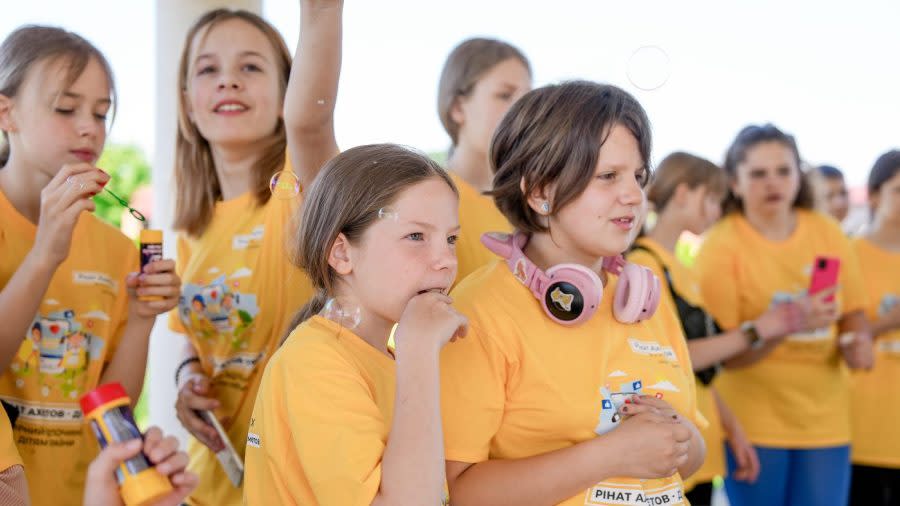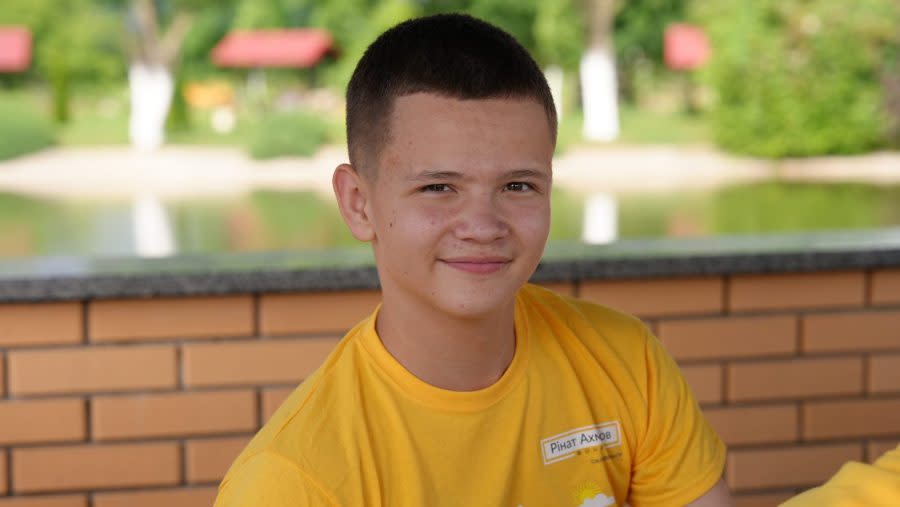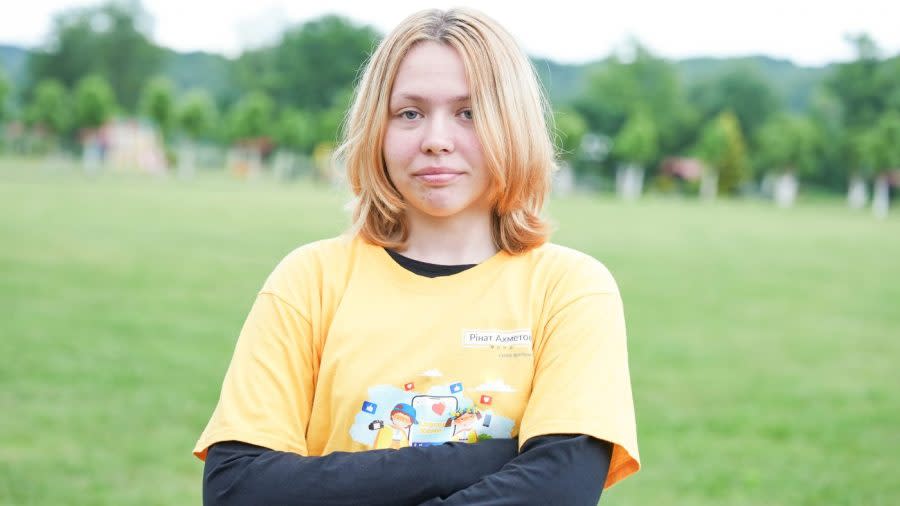Ukrainian camp teaches kids how to heal from war

In 2021, before Mark Rozvozov was even 10, his mother and stepfather were taken by government authorities in the embattled Donetsk region of eastern Ukraine, leaving him alone with his older brother.
Mark said he felt “very shocked” and cried nightly.
A family acquaintance soon began looking after the boys.
The Ukrainian woman’s husband lived in Russia. After Russia’s February 2022 invasion of Ukraine, which Mark said she supported, she left Ukraine to join him. And she took Mark and his brother with her.
The boys would end up staying there for months, far from family.
“I was trying not to think about it,” Mark said. “And I was hoping that everything is OK with my mom and stepdad.”
Mark’s mother was freed later that year in a prisoner exchange. He was returned in December 2022 to Ukraine, and his brother followed. Both now live with their mother back in Ukraine.
Ukraine says more than 19,000 children have been taken into Russia by Russian authorities since the full-scale invasion, with only 388 returned. In 2023, the International Criminal Court issued an arrest warrant for Russian President Vladimir Putin and Presidential Commissioner for Children’s Rights Maria Lvova-Belova for the unlawful deportation of children.
Ukrainian President Volodymyr Zelensky highlighted the issue in a speech over the weekend in Singapore.
“Time is running out, and the children are growing up in a Putinland where they are taught to hate their homeland,” he said.
While Ukraine works to bring those children home, treating those who have been returned is another challenge.

The harrowing experience has taken a mental toll on Mark. His mother recommended he spend time at a camp focused on helping children recover in western Ukraine at the border with Hungary, far from the war in the Carpathian Mountains of the Zakarpattia region.
The camp, “Rinat Akhmetov to Children. Peaceful Recreation for Children of Ukraine,” gave Mark about 10 days of rest and relaxation, along with bonding time with his peers and access to psychologists and mentors.
“I like being here,” Mark said, adding there’s “no shooting [and it is] a nice, quiet place.”
The camp is managed by the Rinat Akhmetov Foundation, a charity run by the Ukrainian billionaire of the same name. (The foundation paid for this reporter’s trip to Ukraine to report on the camp).
It has given a lifeline to Ukrainian children, hard-hit by the war. They are given a chance to have fun, make friends, breathe freely and address any mental health challenges created by the conflict – all at no cost to them.
Oksana Ishchuk, project manager at the foundation, said the war has pushed many children to retreat from their lives, exacerbating a mental health crisis seen across the world.
But by attending the camp, children start to “believe in a better life” and begin to hope, she added.
“Children are becoming more communicative and more open-minded,” Ishchuk said, referring to the results at the end of the camp session. “Thanks to this organization, parents have noticed a huge, positive change in their children.”
The camp, which began in 2015, a year after Russian-backed separatists began waging war against the Ukrainian government, has helped more than 5,000 children. The effort began in eastern Ukraine but has since moved to Zakarpattia after the full-scale invasion.
About 50 children attend each camp, which takes place four times a year. Children are selected based on their vulnerability, with those from frontline territories or occupied regions of Ukraine often given priority, along with those who have lost a parent or guardian.
The latest camp, stretching from the end of May to early June, allowed children to relax at the Hotel Illara, a resort-like hotel with a big swimming pool, a water slide, soccer fields, tennis courts, a pond and other recreational areas. Surrounding the hotel is the scenery of the Carpathian Mountains, with its hiking trails nearby.
The children get to play games and hands-on activities, participate in sports and swim in the hotel pool. There is also a particular focus on blogging, or teaching the children to use their phones to take videos and pictures and post to social media. The camp even brings in some famous Ukrainian actors and performers to speak to the children.

Sonya Zabolotnaya, 16, said she wants to become an Instagram or TikTok influencer and voice her opinions about climate change and environmental issues. She joined the camp in part to learn more about blogging, and has found the atmosphere at the camp positive.
The 10-day retreat is not all fun and games. One aspect of the camp is focused on developing career skills.
And psychologists are available to work with the children to process difficult emotions and deal with any troubling memories or experiences, with the ultimate aim to teach coping skills to take with them when they leave.
Yuliia Kruchkova, a psychologist at the camp, said art therapy is key.
“Art therapy helps them, through creativity, to express themselves … to be strong,” she said. “The most important for those children is to use their imagination, helps them to be concentrated, to build their world.”
Kruchkova works with children one-on-one if they need extra attention. While some campers can have difficulty opening up, she said they work hard to crack those cases, including by contacting their parents or relating to them with their own emotions.
Overall, the children learn to be a part of a community, and though they cannot be “changed totally,” they learn that “everything will be all right.”
“This organization cannot save all the children, not even in Ukraine – but the children who are here in this [camp], they can help and try to do something good for those children,” she said.
One popular method to help combat mental health challenges is for children to write down a fear and stick it into a puppet’s mouth, metaphorically absolving themselves of what has been eating away at them.
Zabolotnaya, who is from Kherson in eastern Ukraine, has found a similar practice to be cathartic.
She was forced to resettle in Kyiv when Russian forces invaded. It has been hard to adjust to a new life, Zabolotnaya said, but working with psychologists has been “great” and has given her more confidence.
“They do help to deal with trauma,” she said. “I used to cry, but right now I can control my emotions.”
The camp has three age groups, with a mentor guiding each one. The youngest is for children around 10 years old, with the second filled by preteens and the third for 14- to 17-year-olds.
Yaroslav Kolesnikov, 21, is a mentor at the camp, helping to guide the oldest students each day, sticking with them wherever they go. Each group has a dedicated mentor, typically a young adult who can connect easier with the students.
Kolesnikov said that for many of the campers, Russia “stole their childhood,” and this camp was one way to give back.
“I want to show them that some people love you,” he said. “We want the children to be happy as much as possible in their situations.”
Kolesnikov, who is from Luhansk, has struggled to deal with the war himself, having been uprooted from his home once the conflict started in 2014.
Following the full-scale invasion, he is living alone. His mother and younger brother fled to Italy, but men are not allowed to leave the country. He is also thinking about enlisting in the military once he reaches 25, the age Ukraine begins drafting troops.
His experience has helped Kolesnikov to connect with the children at the camp, and it has spurred his passion about helping the nation’s youth.
“I need to show them that not all the world is like this,” he said, referring to the war. “There’s a lot of laughing, a lot of freedom and a lot of possibilities.”
On the last day of the camp, the children gathered in a small room, huddling before a projector screen that flashed through pictures taken during their stay.
They watched memorable moments and experiences, from goofy individual smiles to flashy group photos. They held up their phones, swaying flashlights in the dark. One child strummed a guitar, others screeched in laughter.
Later, the mentor of each age group gave a farewell speech; the children danced, laughed and cried as music boomed over the speakers; and no one seemed ready for it to be over.
Copyright 2024 Nexstar Media, Inc. All rights reserved. This material may not be published, broadcast, rewritten, or redistributed.
For the latest news, weather, sports, and streaming video, head to The Hill.


